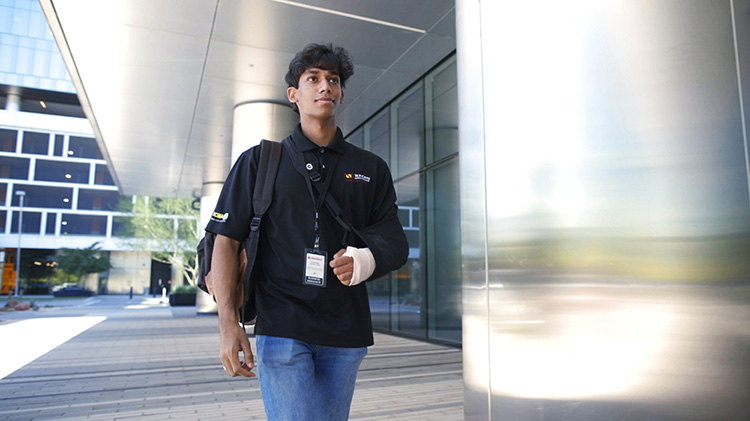Cutting a path for the future
The State Farm® Pathways for the Future program enables students from all backgrounds to get ahead.
After Gil Emmanuel Ruiz became a father, the former U.S. Marine knew it was time to get other parts of his life running smoothly. For Ruiz that meant focusing on educational opportunities to help turn around his career.
Luckily, he was in the right place.
The veteran was one of the first to earn a scholarship to the State Farm Pathways for the Future (PFF) program, a collaboration between State Farm and Arizona State University (ASU) in Tempe, Arizona. Since launching in February 2020, PFF Scholars like Ruiz can take advantage of the various offerings aimed at professional development. The program, funded through State Farm scholarships, caters to the educational needs of a variety of learners — from high schoolers looking to continue their studies to adult learners focused on retooling existing skills.
“It’s not just a scholarship program — we’ve created a sense of community among these students,” says Kalani Rice, program manager for the PFF program at ASU.
Students take part in the career pathways program in several ways: through degree, certificate or one-off courses to tailor their own programs. The variety of offerings and custom career counseling allows students to mix-and-match educational opportunities to meet their career needs. Learners get help picking their own courses to create a “pathway to college,” Rice says. Another program goal is to increase degree completion by preparing students to enroll in the Ira A. Fulton Schools of Engineering, the W. P. Carey School of Business or the College of Liberal Arts and Sciences.
And the program goes far beyond academics.
Students can tap into tailored career resources necessary to continuously develop and adapt to the workforce, including a dedicated career transition support program manager, a program coordinator and two career counselors. Many participants also take advantage of digital portfolio and résumé-building services. Often, the additional support makes it easier to understand how to transition into a growing field while using their previous knowledge. “There’s a strong emphasis on the mentorship components of the program,” says Rice.
For Neil Bhuyan, a Pathways participant, the scholarship program has allowed him to make connections while getting real-world work experience. This year, the college junior was able to intern as part of the State Farm purchasing department to gain hands-on experience. As a double major in supply chain management and business data analytics, Bhuyan says that putting his studies into practice throughout the internship will make it easier to make the transition into a full-time job. “They really want to develop you for your future,” he says. “I’ve learned a lot.”
Building skills for tomorrow
For State Farm, this is a chance to give back. "The PFF curriculum helps students retool while incorporating educational opportunities around data and advanced analytics," says Ed Woods, Director of Corporate Responsibility at State Farm. The goal is to enable career readiness across a wide swath of students by giving them an opportunity for a fresh start or to continue their education.
For now, the PFF program is focused on upskilling participants’ existing qualifications in order to find more promising opportunities. The need is acute in areas where technology and automation have changed the nature of work. For companies like State Farm, this provides important opportunities to fill the gaps. “We’re seeing a number of people in the workforce that would be displaced and that would need new skillsets,” says Woods.
PFF is now a State Farm signature program in the education space, focusing on providing scholarship and certificate opportunities as well as specific courses for students to enter jobs in the data analytics space. “We need to be helping people who are displaced from an economic standpoint, and one way to help people is to be gainfully employed,” says Woods.
Volunteer mentor
Thanks to the program, many State Farm employees are also participating in mentor and volunteer opportunities as well as making appearances on campus (some via Zoom, for now). The regional headquarters for State Farm are nearby, making further collaboration easier. Recently, members of the State Farm Hispanic Employee Resource Organization mentored students in the PFF program, and additional employees participated in volunteer days with program participants. Company employees also regularly speak to classes about the ins and outs of professional networking. “It’s incredible to be helping students who are excited to get into their career and remove those barriers,” says Stacie Wylie, a corporate responsibility analyst at State Farm, who has participated in the volunteer events.
Erin O’Conner, a Pathways scholar in the Masters in Sustainability Leadership Program, works from home while parenting a toddler and taking ASU classes online. While the program helped to ease some financial burden for her, the career opportunities and resources have helped her put her education into practice in ways that make sense for her needs and passions. “They not only give you the financial assistance to earn the degree and gain the knowledge that you need, but then they also help you align with professionals in the area or just provide information of what you can do with those tools,” she says.
Enabling online growth
Today, the program is growing beyond the ASU campus with an increase in virtual programming. Already, 29,000 learners have logged on to m3, an online interactive major and career quiz that was built as part of the offerings with State Farm. It allows students to explore their interests and match them to ASU majors. Since launching enhancements to the tool this year, students from more than 75 countries have logged on to better assess their own career aspirations.
Another virtual offering available is MyPath2SUTM, a transfer guide for learners to understand how their transfer credits will be applicable to more than 400 ASU majors. “Already, more than 30,000 students are actively on pathways to ASU from community colleges locally and nationally,” Rice says.
As the program grows, the goal is to continue to offer both in-person and online curriculum to ensure the program can have an impact on the lives of students who need it most. “We’re looking to provide the knowledge and skills necessary for life and work in the 21st century,” says Woods. “It speaks to our concept of being a lifelong learner.”




